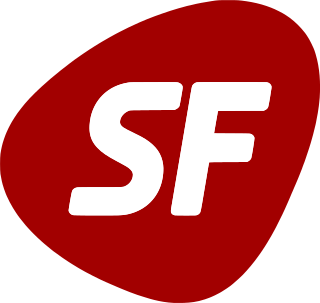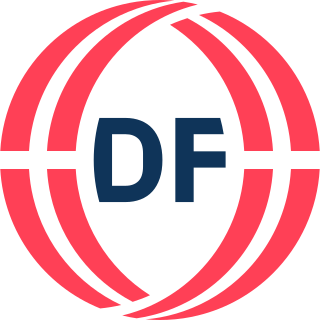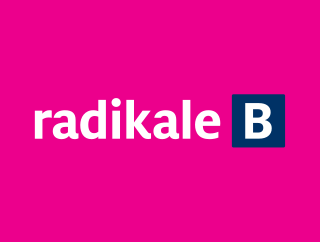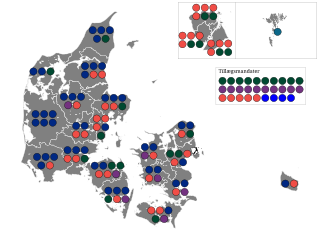| | ||||||||||||||||||||||||||||||||
| ||||||||||||||||||||||||||||||||
All 114 seats in the Folketing 58 seats needed for a majority | ||||||||||||||||||||||||||||||||
This lists parties that won seats. See the complete results below.
| ||||||||||||||||||||||||||||||||
 |
|---|
Folketing elections were held in Denmark on 9 April 1895. [1]
| | ||||||||||||||||||||||||||||||||
| ||||||||||||||||||||||||||||||||
All 114 seats in the Folketing 58 seats needed for a majority | ||||||||||||||||||||||||||||||||
This lists parties that won seats. See the complete results below.
| ||||||||||||||||||||||||||||||||
 |
|---|
Folketing elections were held in Denmark on 9 April 1895. [1]
 | |||||
|---|---|---|---|---|---|
| Party | Votes | % | Seats | +/– | |
| Venstre Reform Party | 89,530 | 53 | +24 | ||
| Højre | 64,395 | 25 | –6 | ||
| Moderate Venstre | 42,635 | 27 | –12 | ||
| Social Democratic Party | 24,510 | 8 | +6 | ||
| Independents | 1 | +1 | |||
| Total | 114 | +12 | |||
| Registered voters/turnout | 376,350 | 60.2 | |||
| Source: Nohlen & Stöver (voters/turnout) | |||||

The Green Left is a democratic socialist political party in Denmark.

Venstre, full name Venstre, Danmarks Liberale Parti, is a conservative-liberal, agrarian political party in Denmark. Founded as part of a peasants' movement against the landed aristocracy, today it espouses an economically liberal, pro-free-market ideology.
The Conservative People's Party, also known as The Conservatives is a centre-right political party in Denmark. The party is a member of the International Democracy Union and the European People's Party.
The Social Democrats is a social democratic political party in Denmark. A member of the Party of European Socialists, the Social Democrats have 50 out of 179 members of the Danish parliament, Folketing, and three out of fourteen MEPs elected from Denmark.

The Danish People's Party is a nationalist and right-wing populist political party in Denmark. It was formed in 1995 by former members of the Progress Party (FrP).

The South Schleswig Voters' Association is a regionalist political party in Schleswig-Holstein in northern Germany. The party represents the Danish and Frisian minorities of the state.

Siumut is a political party in Greenland in the social democratic tradition. Since the establishment of home rule in 1979, it has been the dominant party in Greenland. Siumut is led by Erik Jensen, who beat the then-incumbent Prime Minister Kim Kielsen in a tight leadership contest in late 2020.

The Folketing, also known as the Parliament of Denmark or the Danish Parliament in English, is the unicameral national legislature (parliament) of the Kingdom of Denmark — Denmark proper together with the Faroe Islands and Greenland. Established in 1849, the Folketing was the lower house of the bicameral parliament called the Rigsdag until 1953; the upper house was the Landsting.

General elections were held in Denmark on 20 November 2001. For the first time since the 1924 elections, the Social Democrats did not win the most seats. Anders Fogh Rasmussen of the centre-right Venstre became Prime Minister in coalition with the Conservative People's Party, as the head of the first Rasmussen government, with the support from Danish People's Party.

The Christian Democrats are a political party in Denmark. The party was founded in April 1970 as the Christian People's Party to oppose the liberalization of restrictions on pornography and the legalization of abortion. The party renamed itself to its current name in 2003. Originally, the party was not considered part of the European Christian-democratic tradition, and it was better known as a religious conservative party.
The Red–Green Alliance or Unity List is an eco-socialist political party in Denmark. It was founded in 1989 with the merger of three Marxist parties and it is the most left-wing party in the Folketing, where it advocates for the expansion of the welfare state and social justice as well as the socialist transformation of Denmark and the entire globe. During the 2021 Copenhagen City Council election the party placed first, with 24.6% of the votes. The party is also active in various trade unions within Denmark.

The Danish Social Liberal Party is a social-liberal political party in Denmark. The party was founded as a split from the Venstre Reform Party in 1905.

There are three types of elections in Denmark: elections to the national parliament, local elections, and elections to the European Parliament. Referendums may also be called to consult the Danish citizens directly on an issue of national concern.

Inuit Ataqatigiit is a democratic socialist, separatist political party in Greenland that aims to make Greenland an independent state. The party, founded as a political organisation in 1976, was born out of the increased youth radicalism in Denmark during the 1970s. Traditionally in favour of a socialist economy, the party has been criticised by the left for having gradually moved towards a capitalist approach, supporting a market economy and privatisation. Inuit Ataqatigiit believes that an independent Greenland should be competitive while fighting to keep the environment clean.

The Social Democratic Party is a social-democratic political party on the Faroe Islands, led by Aksel V. Johannesen.

The National Socialist Workers' Party of Denmark was the largest Nazi Party in Denmark before and during the Second World War.

Folketing elections were held in Denmark on 26 April 1920, except in the Faroe Islands, where they were held on 20 May. The election campaign was the most aggressive and bitter in Denmark in the 20th century. Voter turnout was 80.6% in Denmark proper and 58.8% in the Faroe Islands.

The Liberal Alliance is a classical liberal and right-libertarian political party in Denmark. The party is a component of the centre-right bloc in Danish politics. The party's platform is based upon economic liberalism, promotion of tax cuts and reduction of welfare programmes, and a critical, oppositional stance towards European integration.

The politics of Denmark take place within the framework of a parliamentary representative democracy, a constitutional monarchy and a decentralised unitary state in which the monarch of Denmark, King Frederik X, is the head of state. Denmark is a nation state. Danish politics and governance are characterized by a common striving for broad consensus on important issues, within both the political community and society as a whole.